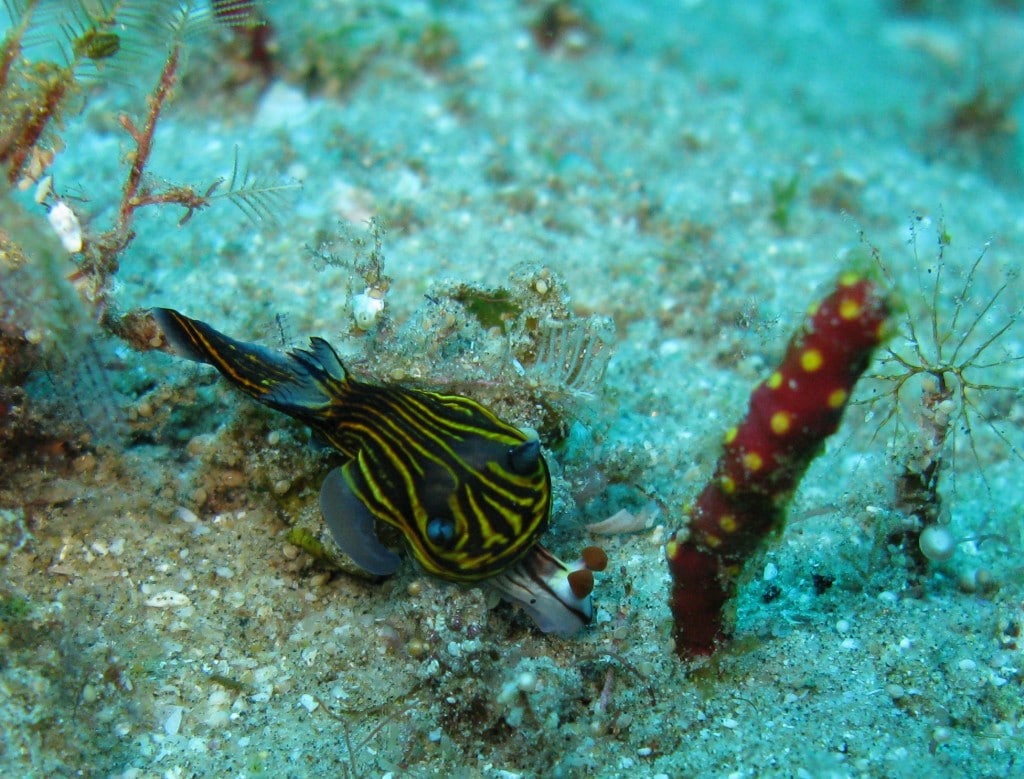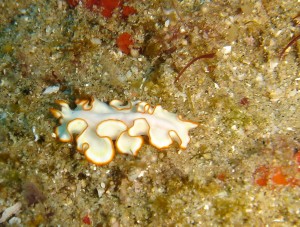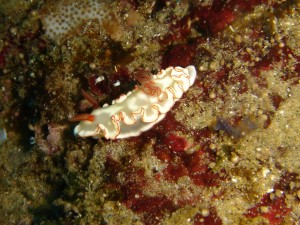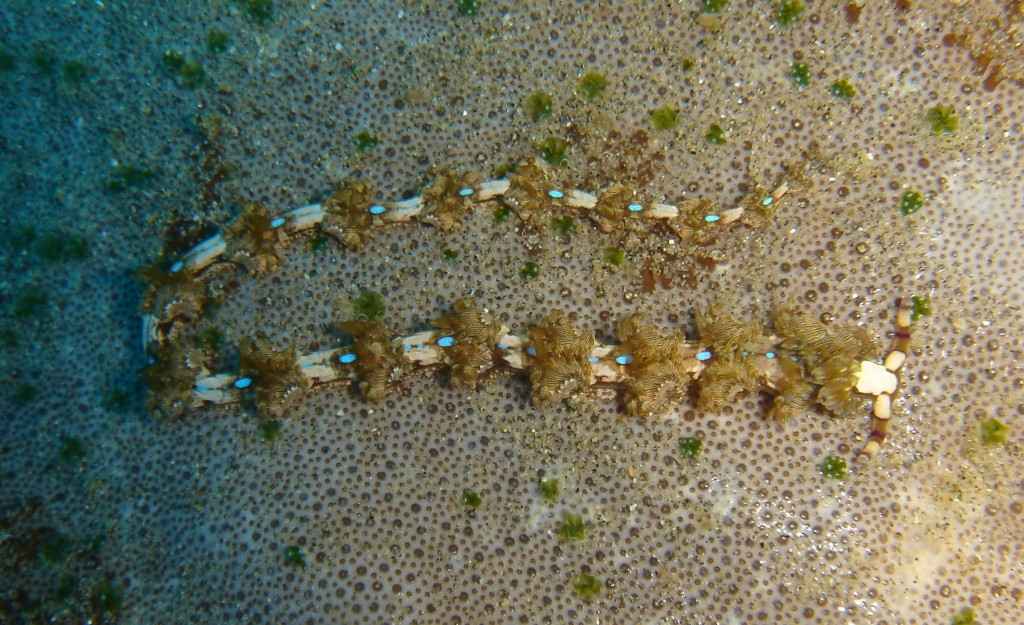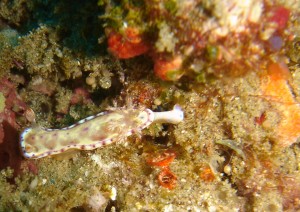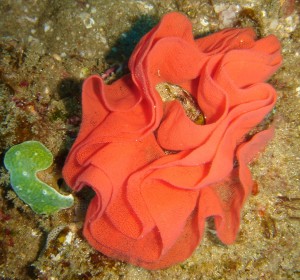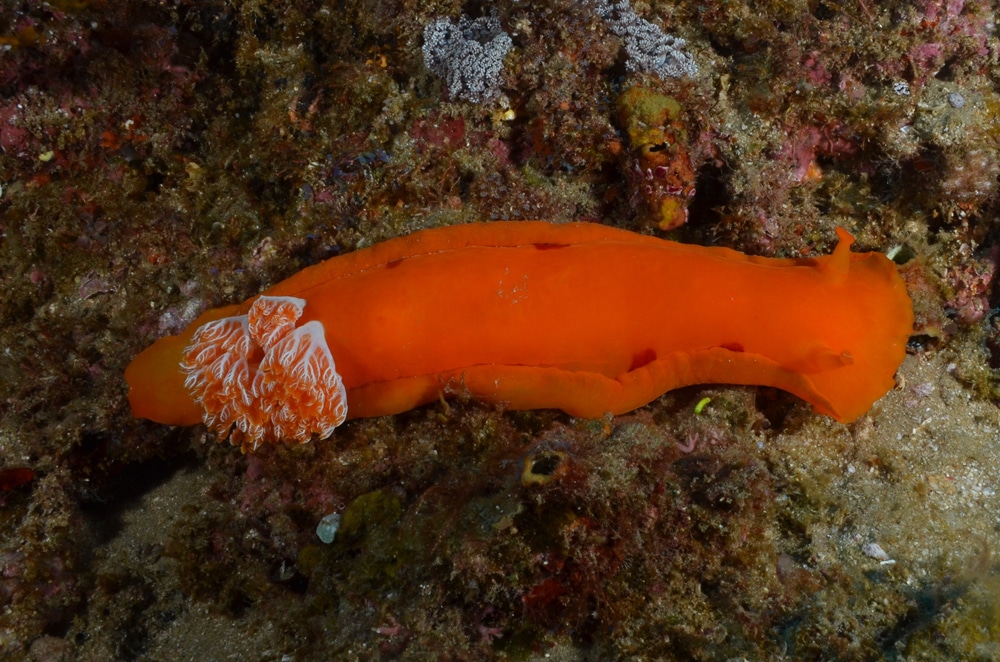Marine Life & Conservation
Nudibranchs and the fabulous Spanish Dancer (Hexabranchus sanguineus)
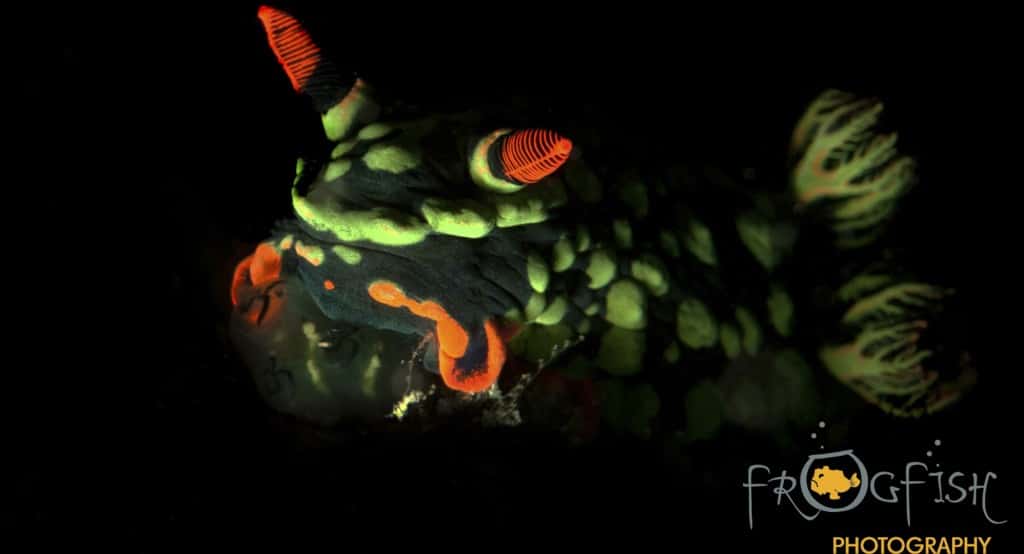
Every good Dive Master/photographer has a problem. They must look after their clients while still taking pictures. They have no time to vary the depth of focus, no time to change camera settings; their dive clients must always come first. Colin Ogden of Amoray Diving at Sodwana Bay solved the problem by shooting nudibranchs, and his study of these amazing creatures has become a passion. I spent a spellbinding evening with him learning about them.
Nudibranchs come in brilliant colours, with fabulous markings, and they can vary in size from 1mm to 600mm. They are primarily carnivores and will eat hydroids and other species of nudibranchs but most of them feed on sponges; all of which are animals. A few will eat algae or seaweed. They feed where food is available so they frequent areas where coral growth is limited; even the cold Northern European waters harbour these colourful sea slugs and nudibranch hunting has become a global passion.
Nudibranch means exposed gills. Hexabranchus, for example, has six sets of exposed gills. All but two nudibranchs are called by their Latin names. The scientific community frowns on them being given common names so the study of these creatures is not for the faint-hearted.
Most of them breath using the exposed bunches of gills on their backs, and their sensual organs are contained in a pair of rhinophores, on the front of their heads. These look like horns. All are hermaphrodite, with both male and female sex organs, which are always on the right hand side, below the neck. These can be expelled to accommodate a large meal, and then re-ingested. All of them are poisonous to fish, and a single nudibranch can kill an entire aquarium full of fish if it becomes stressed and lets off a toxin. This occasionally benefits the palatable flatworm. He sometimes mimics the shape and rhinophores of the poisonous nudibranch, escaping predators and protecting himself.
There is even a species that farms algae in its gills. It is long and thin and has many sets of gills or cerata which he uses to collect algae. You will sometimes find it spread out along the top of the reef on a sunny day, cerata exposed to catch the sun so the algae will grow faster.
The spectacular Spanish Dancer (Hexabranchus sanguineus) is one of the very few nudibranchs that goes by its common name. They grow up to 600mm long, so are clearly identifiable. “They are nocturnal animals in our waters, so we rarely spot them in Sodwana Bay. However, we found two on the point of mating on Seven Mile in broad daylight. They lined up neck to neck, and then they exchanged sperm, fertilising each other. After five or six days each lays a long egg ribbon in a continuous circle, and you can see these on the reef looking like soft rosettes.”
They are normally pink, reddish or orange. These ribbons are preyed upon by other nudibranchs of the Favourinus family and the survivors hatch into tiny nudibranchs that look nothing like their imposing parents.
Other species lay egg ribbons that hatch into tiny veligers, which are a larval stage, and they can float around in the ocean, following currents for months on end. When they sense that there is a food source, they will descend onto the reef and metamorphose into small nudibranchs. The study of these creatures is still in its infancy, although some were described as early as the 1700s, but they are fascinating creatures, and there are still many unnamed and quite rare species in our waters. Once you know what you are looking for, you can find them almost everywhere.
Words: Jill Holloway
Pictures and technical data: Colin Ogden, Amoray Diving
Copyright Ocean Spirit 2017 – www.osdiving.com
Marine Life & Conservation
Double Bubble for Basking Sharks

 The Shark Trust is excited to announce that, for two more days only, all donations, large or small, will be doubled in the Big Give Green Match Fund!
The Shark Trust is excited to announce that, for two more days only, all donations, large or small, will be doubled in the Big Give Green Match Fund!
Donate to Basking in Nature: Sighting Giants
The Shark Trust is hoping to raise £10k which will be doubled to £20k. This will go towards Basking in Nature: Sighting Giants. And they need YOUR help to reach they’re goal.
The Shark Trust’s citizen science project is to monitor and assess basking sharks through sightings; encouraging data collection, community engagement, and promoting nature accessibility. This initiative aims to enhance health and wellbeing by fostering a deeper connection with British Sharks.
Campaign Aims
- Increase citizen science reporting of Basking Sharks and other shark sightings to help inform shark and ray conservation.
- Provide educational talks about the diverse range of sharks and rays in British waters and accessible identification guides!
- Create engaging and fun information panels on how to ID the amazing sharks and rays we have on our doorstep! These can be used on coastal paths around the Southwest. With activities and information on how you can make a difference for sharks and rays!
- Promote mental wellbeing through increasing time in nature and discovering the wonders beneath the waves!
Donate, and double your impact. Click Here
Marine Life & Conservation
Leading UK-based shark conservation charity, the Shark Trust, is delighted to announce tour operator Diverse Travel as a Corporate Patron

 Corporate Patrons provide a valuable boost to the work of The Shark Trust. The Trust team works globally to safeguard the future of sharks, and their close cousins, the skates and rays, engaging with a global network of scientists, policymakers, conservation professionals, businesses and supporters to further shark conservation.
Corporate Patrons provide a valuable boost to the work of The Shark Trust. The Trust team works globally to safeguard the future of sharks, and their close cousins, the skates and rays, engaging with a global network of scientists, policymakers, conservation professionals, businesses and supporters to further shark conservation.
Specialist tour operator Diverse Travel has operated since 2014 and is committed to offering its guests high quality, sustainable scuba diving holidays worldwide. Working together with the Shark Trust will enable both organisations to widen engagement and encourage divers and snorkellers to actively get involved in shark conservation.
“Sharks are truly at the heart of every diver and at Diverse Travel, we absolutely share that passion. There is nothing like seeing a shark in the wild – it’s a moment that stays with you forever!” says Holly Bredin, Sales & Marketing Manager, Diverse Travel.
“We’re delighted to celebrate our 10th year of business by becoming a Corporate Patron of the Shark Trust. This is an exciting partnership for Diverse and our guests. We will be donating on behalf of every person who books a holiday with us to contribute towards their vital shark conservation initiatives around the world. We will also be working together with the Trust to inspire divers, snorkellers and other travellers to take an active role – at home and abroad – in citizen science projects and other activities.”
Paul Cox, CEO of The Shark Trust, said:
“It’s an exciting partnership and we’re thrilled to be working with Diverse Travel to enable more divers and travellers to get involved with sharks and shark conservation. Sharks face considerable conservation challenges but, through collaboration and collective action, we can secure a brighter future for sharks and their ocean home. This new partnership takes us one more valuable step towards that goal.”
For more information about the Shark Trust visit their website here.
For more about Diverse Travel click here.
-

 News3 months ago
News3 months agoHone your underwater photography skills with Alphamarine Photography at Red Sea Diving Safari in March
-

 News3 months ago
News3 months agoCapturing Critters in Lembeh Underwater Photography Workshop 2024: Event Roundup
-

 Marine Life & Conservation Blogs2 months ago
Marine Life & Conservation Blogs2 months agoCreature Feature: Swell Sharks
-

 Blogs2 months ago
Blogs2 months agoMurex Resorts: Passport to Paradise!
-

 Blogs2 months ago
Blogs2 months agoDiver Discovering Whale Skeletons Beneath Ice Judged World’s Best Underwater Photograph
-

 Gear Reviews3 months ago
Gear Reviews3 months agoGear Review: Oceanic+ Dive Housing for iPhone
-

 Marine Life & Conservation2 months ago
Marine Life & Conservation2 months agoSave the Manatee Club launches brand new webcams at Silver Springs State Park, Florida
-

 Gear Reviews2 weeks ago
Gear Reviews2 weeks agoGEAR REVIEW – Revolutionising Diving Comfort: The Sharkskin T2 Chillproof Suit


